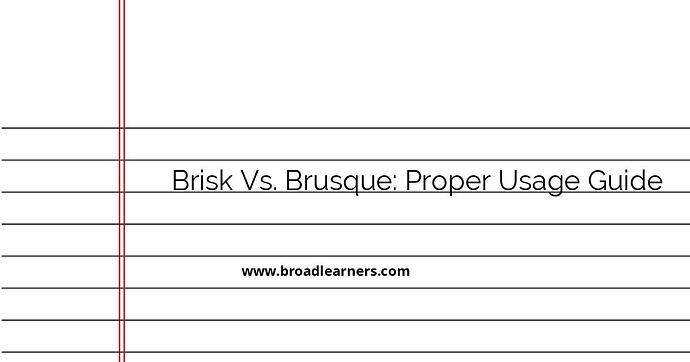In the realm of vocabulary, selecting the right word for your context is crucial. Two words that often confuse English learners and even native speakers are ‘brisk’ and ‘brusque’. Although they sound somewhat similar, their meanings and connotations are distinct. Let's delve into a comprehensive comparison to help you understand their proper usage:
- Brisk
- The word 'brisk' generally has positive connotations and is often used to describe something quick, energetic, or lively. It can refer to physical actions, weather conditions, or even business activities.
- Common Usage: It is often used to refer to movements, weather, or trade. For instance:
- Brisk Walk: A quick and energetic form of walking that is often recommended for exercise.
- Brisk Weather: Refers to cool and invigorating weather that is often seen as refreshing.
- Brisk Business: Indicates that business is going well, with a lot of activity or sales taking place.
Examples:
"She took a brisk walk in the park to clear her mind."
"The brisk wind brought a chill to the air, making it feel revitalizing."
"The market was brisk today with many transactions taking place."
- Brusque
- 'Brusque' carries a more negative connotation. It describes behavior that is blunt, abrupt, or curt, often coming across as rude or unfriendly.
- Common Usage: It is often used to describe encounters, communication style, or personality traits that are perceived as harsh or dismissive.
- Brusque Reply: A short and potentially rude response that lacks warmth or politeness.
- Brusque Manner: A way of interacting that is abrupt and may seem unfriendly or rude.
- Brusque Tone: A tone of voice that is sharp or concise, often perceived as lacking friendliness.
Examples:
"His brusque reply left her feeling insulted and dismissed."
"Despite her brusque manner, she was respected for her honesty and efficiency."
"The manager's brusque tone made the conversation uncomfortable and tense."
While 'brisk' and 'brusque' might seem similar due to their phonetic likeness, their meanings, nuances, and impacts on communication are quite different.
Understanding the Distinction:
To ensure correct usage, consider the context and the connotation you wish to convey. Use 'brisk' for contexts that are lively and positive, and 'brusque' when describing actions or tones that are abrupt and potentially negative.
Summary: To master these words:
- Choose ‘brisk’ for quick, lively, and energetic contexts. Example: "After a brisk shower, he felt completely refreshed."
- Select ‘brusque’ when describing behavior that is short, abrupt, and may appear unfriendly. Example: "Her brusque response made them question her attitude."
By understanding these differences, you can enrich your language skills and communicate more effectively.
Did I miss anything? Respond below
